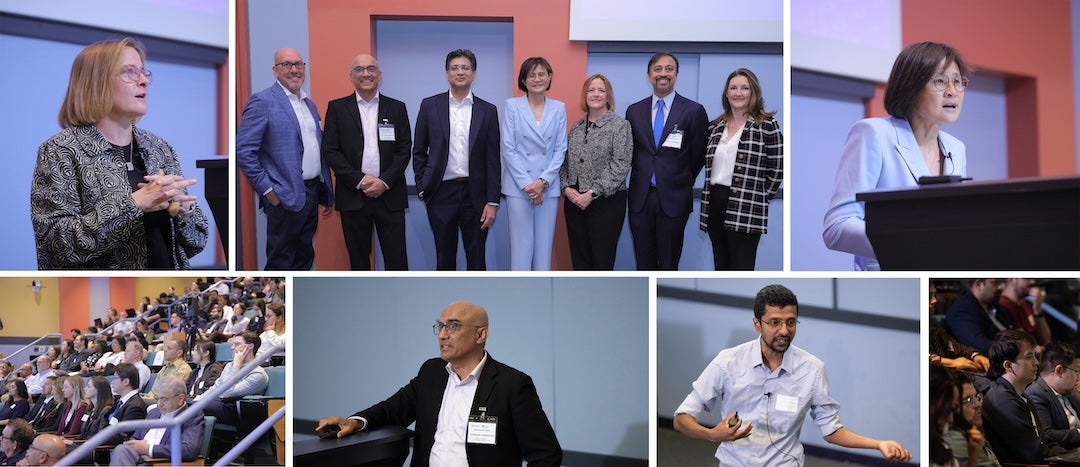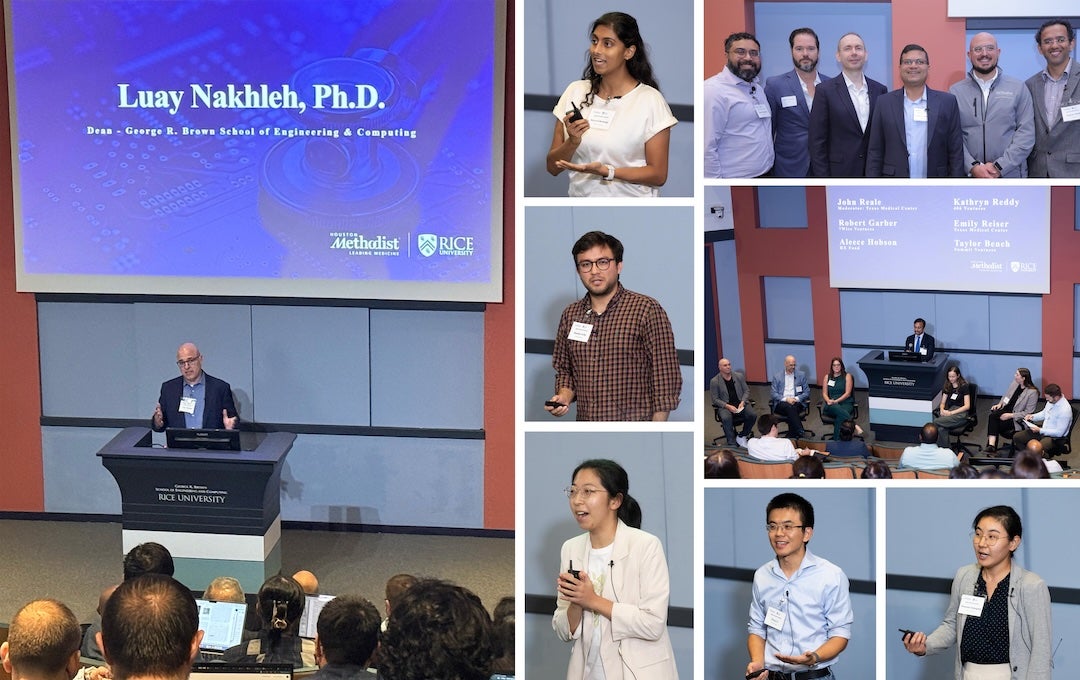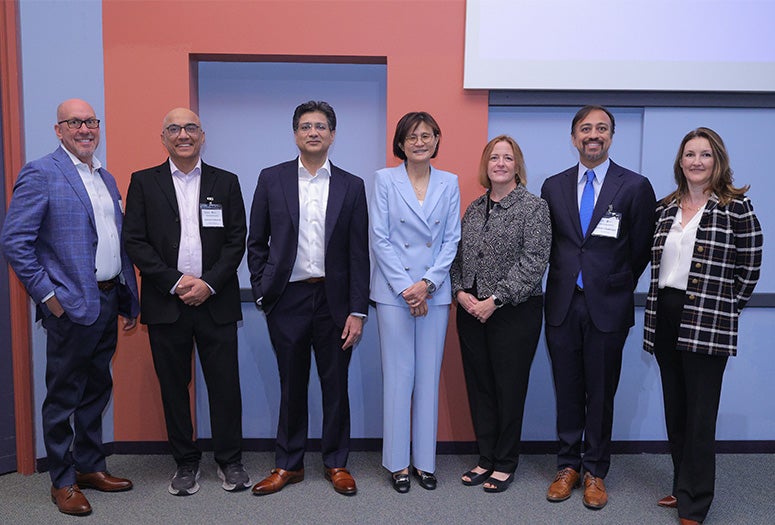The Digital Health Institute, a joint initiative of Rice University and Houston Methodist, held its inaugural summit Oct. 8 at Rice, drawing about 350 registered guests for a daylong look at how artificial intelligence, data science and engineering are transforming patient care.
The institute, established in 2024, connects researchers and clinicians working at the intersection of technology and medicine. Its focus areas span artificial intelligence and machine learning, digital diagnostics, wearable and implantable sensors, robotics and computational biology. Through sustained collaborations, the institute aims to advance precision medicine, reduce clinician workload and improve patient outcomes.
Jenny Chang, president and CEO of the Houston Methodist Academic Institute, and Amy Dittmar, Rice’s Howard R. Hughes Provost and executive vice president for academic affairs, opened the summit with remarks on the growing collaboration between the two institutions.
Chang said the partnership brings together “clinical excellence in cardiovascular engineering, data science and innovation” to shape a more personalized future of health care.
“We can now have a future that we can predict, we can personalize and balance healthcare as we move forward,” Chang said. “But we have to remember that it’s not all about technology. At the heart of all this is people. We serve patients … with dignity, empathy, intelligence and integrity.”
Dittmar described the institute as an example of Rice’s strategic focus on health innovation and partnership with the Texas Medical Center. The institute, she said, “provides a unique opportunity to design, develop and measure the efficacy of products and systems from beginning to end, all with people at the center of it.” She highlighted projects ranging from wearable and implantable sensors to AI tools for medical imaging, and simulations that improve clinical decision-making.
“Together, our institutions are expanding access to quality health care through the responsible use of artificial intelligence,” Dittmar said.

Khurram Nasir, the William A. Zoghbi Centennial Chair in Cardiovascular Medicine and division chief of cardiovascular prevention and wellness at Houston Methodist and DHI co-director, said the institute was founded to overcome the fragmentation that often stalls digital health innovation — the gap “between data and discovery, between development and deployment.” He emphasized that Houston Methodist’s integrated data infrastructure, combined with Rice’s engineering capabilities, could help raise Houston’s profile as a leading hub in digital health translation.
“If we build it the right way here, with our diversity, our density and our complexity, we will become the North Star for the rest of the world,” Nasir said.
From the Rice side, Ashutosh Sabharwal, the Ernest Dell Butcher Professor of Engineering and professor of electrical and computer engineering and DHI co-director, spoke about the rapid growth of research and talent around digital health. Over the past two years, Rice has added new faculty and launched more than 20 collaborative projects with Houston Methodist clinicians.
“We have faculty who work on unique ways of looking at data, and collectively we can essentially look at all forms of data,” he said.
Sabharwal noted the partnership is not only producing research but also streamlining how ideas move from concept to clinical testing.
“We are removing all bottlenecks along the way,” he said.
Pothik Chatterjee, DHI executive director, detailed how the institute is building an ecosystem to accelerate translation — from algorithm design and validation to regulatory approval and commercialization — positioning Houston as a national model for AI-driven health innovation.

Luay Nakhleh, dean of Rice’s George R. Brown School of Engineering and Computing, tied the event to Rice’s long history of health-related engineering partnerships. He noted that the university’s collaboration with the Texas Medical Center dates back to early projects such as the artificial heart in the 1960s and remains central to the school’s mission today.
“Our collaboration with Houston Methodist is the perfect type of collaboration,” Nakhleh said. “We bring engineering and computing expertise to the table, and Houston Methodist brings the complementary clinical expertise that is needed for an area like digital health.”
Nakhleh added that the complementary nature of the partnership extends beyond technical expertise to a shared “attitude towards research.”
“I would say that both institutions emphasize and highlight innovation, rigor and high-quality work,” he said.
The summit’s structure reflected the DHI’s overarching mission: to unite clinicians, engineers and entrepreneurs in developing and deploying technologies that improve patient outcomes. Morning discussions focused on clinical applications and unmet needs, while afternoon sessions highlighted Rice faculty projects in AI, sensing, imaging and computational biology. The day concluded with a venture capital panel exploring investment strategies, challenges in adoption and the growing expectation that health innovations demonstrate measurable impact.
Together, the conversations underscored the institute’s founding goal — to turn discovery into impact through collaboration. By linking Rice’s engineering and AI expertise with Houston Methodist’s clinical innovation ecosystem, the DHI is piloting a unique model for how academic and medical partnerships can accelerate patient-centric care.
- Video is available at:
-
https://www.youtube.com/watch?v=_QIkfz0561M (Video by Jared Jones/Rice University)
- Access associated media files:
-
https://www.withlovewithluxe.com/RICE-ENGINEERING-PROJECTS/Rice-HMRDHI-Launch-Event/n-BSfQwp (Credit: Luxe Studio Productions)
https://rice.box.com/s/l6xc7dex4bankipx77avs4hpvcy2sfau (Credit: Jeff Fitlow/Rice University)

